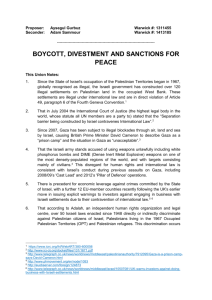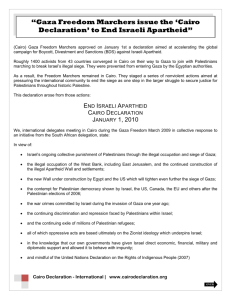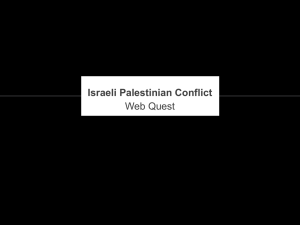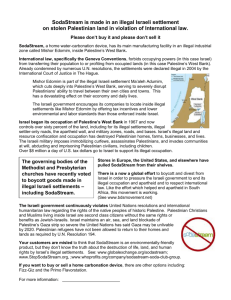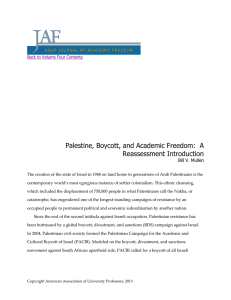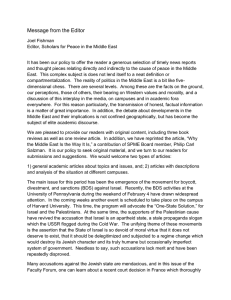Falk Note on BDS and state responsibility
advertisement
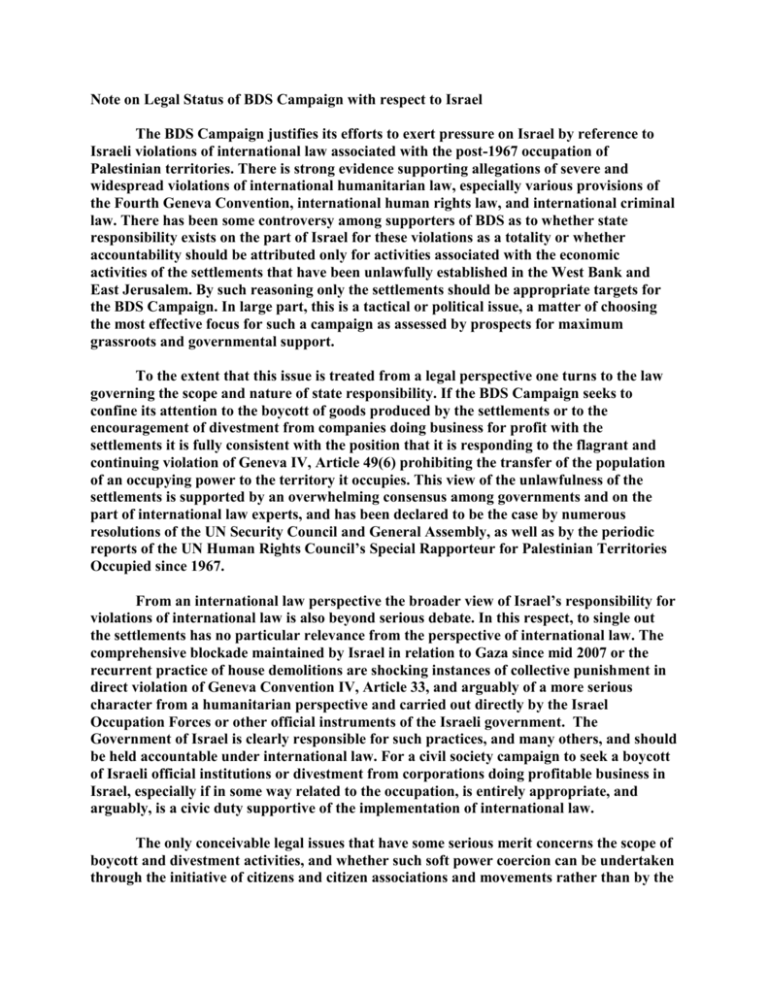
Note on Legal Status of BDS Campaign with respect to Israel The BDS Campaign justifies its efforts to exert pressure on Israel by reference to Israeli violations of international law associated with the post-1967 occupation of Palestinian territories. There is strong evidence supporting allegations of severe and widespread violations of international humanitarian law, especially various provisions of the Fourth Geneva Convention, international human rights law, and international criminal law. There has been some controversy among supporters of BDS as to whether state responsibility exists on the part of Israel for these violations as a totality or whether accountability should be attributed only for activities associated with the economic activities of the settlements that have been unlawfully established in the West Bank and East Jerusalem. By such reasoning only the settlements should be appropriate targets for the BDS Campaign. In large part, this is a tactical or political issue, a matter of choosing the most effective focus for such a campaign as assessed by prospects for maximum grassroots and governmental support. To the extent that this issue is treated from a legal perspective one turns to the law governing the scope and nature of state responsibility. If the BDS Campaign seeks to confine its attention to the boycott of goods produced by the settlements or to the encouragement of divestment from companies doing business for profit with the settlements it is fully consistent with the position that it is responding to the flagrant and continuing violation of Geneva IV, Article 49(6) prohibiting the transfer of the population of an occupying power to the territory it occupies. This view of the unlawfulness of the settlements is supported by an overwhelming consensus among governments and on the part of international law experts, and has been declared to be the case by numerous resolutions of the UN Security Council and General Assembly, as well as by the periodic reports of the UN Human Rights Council’s Special Rapporteur for Palestinian Territories Occupied since 1967. From an international law perspective the broader view of Israel’s responsibility for violations of international law is also beyond serious debate. In this respect, to single out the settlements has no particular relevance from the perspective of international law. The comprehensive blockade maintained by Israel in relation to Gaza since mid 2007 or the recurrent practice of house demolitions are shocking instances of collective punishment in direct violation of Geneva Convention IV, Article 33, and arguably of a more serious character from a humanitarian perspective and carried out directly by the Israel Occupation Forces or other official instruments of the Israeli government. The Government of Israel is clearly responsible for such practices, and many others, and should be held accountable under international law. For a civil society campaign to seek a boycott of Israeli official institutions or divestment from corporations doing profitable business in Israel, especially if in some way related to the occupation, is entirely appropriate, and arguably, is a civic duty supportive of the implementation of international law. The only conceivable legal issues that have some serious merit concerns the scope of boycott and divestment activities, and whether such soft power coercion can be undertaken through the initiative of citizens and citizen associations and movements rather than by the formal action of governments. Whether there exist legal outer limits for boycott and divestment targets has never been tested judicially, for instance, a corporate claim that its trade with Israel is not connected with Israeli policies that violate international law or cultural or academic targets of a boycott that contend a lack of connection with the Israeli state. There is no authoritative international law on the degree to which such nonviolent coercion can derive from such private action, but there are numerous precedents based on practice. Most notably, grassroots BDS efforts were integral to the anti-apartheid campaign of the late 1980s and 1990s, and were accorded approval both by the acquiescence of governments, including those such as the United States and United Kingdom that were initially supportive of the South African Government. The activity associated with such a campaign is considered a legally protected aspect of political freedom in a constitutional democracy. This conclusion of legality is reinforced by the instruments of BDS being entirely voluntary and largely based on persuasion based upon allegations of unlawful Israeli occupation policies, seeking to influence the citizenry and government of Israel to abandon its unlawful policies, which in essence would require a complete end of the occupation, including dismantling of the settlements and respect for the legal rights of Palestinian refugees. BDS seeks to persuade individuals to boycott Israel tourism, as well as cultural, sporting, and academic events and products. In the same spirit, it seeks directly to induce corporations to cease their business activities relating to Israel, and if they do not do so, to persuade institutions (churches, universities, pension funds) to divest from such companies. The most ambitious goal of this global BDS campaign is to persuade governments, especially those with strong economic and military ties to Israel, to join in these efforts of civil society by adopting sanctions and by ceasing all forms of assistance. The prevailing view is that all such activities are consistent with international law and the legal positions repeatedly adopted by the United Nations. In light of the persistent and severity of the Israeli violation of fundamental Palestinian rights for a period of over sixty years, and given the failure of the United Nations and the governments of the world to implement Palestinian rights, it is politically and morally appropriate, as well as legally correct, to accord maximum support to the BDS campaign. Richard Falk (September 19, 2010)
